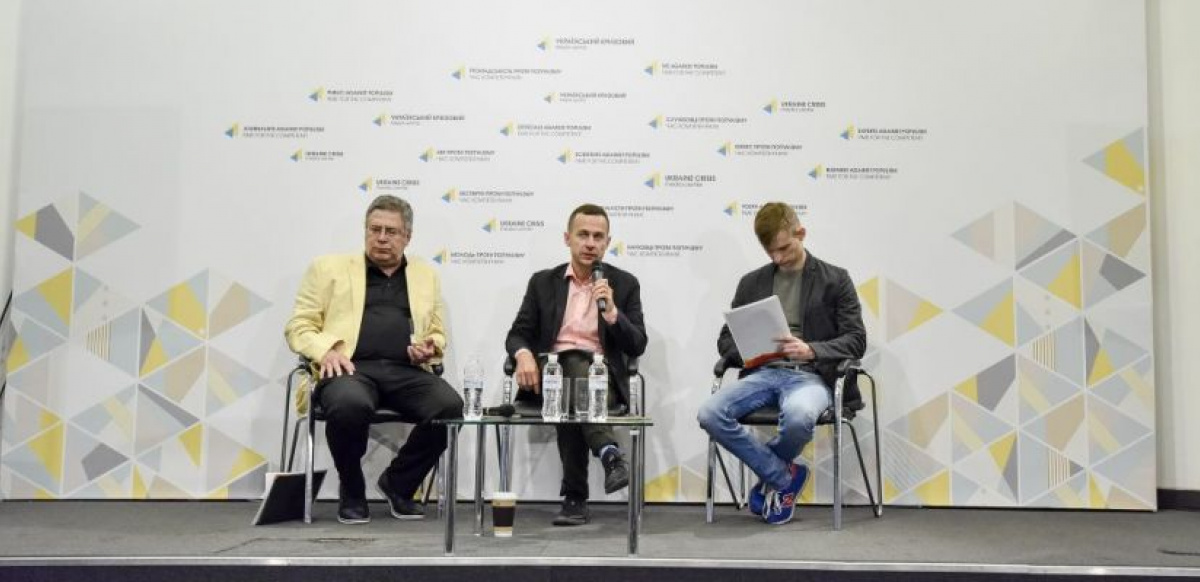
Nearly 20 per cent of evening news broadcasts and 26 per cent of printed media of the so-called “DPR” contain hate speech. No hate speech was found in the news broadcasts of regional TV-channels in Government-controlled territories, while 2 per cent of printed materials contain elements of hate speech, (mostly in quotes of official spokespersons on ATO and other officials), according to results of a research “Hate speech in printed media and TV of Donbas”, conducted by Ukrainian NGO “Donetsk Institute of Information”, with support of the Ministry of Foreign Affairs of Germany and German media-organization MiCT. The monitoring covers publications of eight printed media (4 media on both sides of the contact line) in March-April 2017 and news broadcasts during the 3rd week of July on four TV channels (two in Government controlled and two in “DPR”-controlled territories).
«However, this low per cent of hate speech in the media on Government-controlled territories does not reflect the situation in all media throughout Ukraine, because the media of Donbas are particular. It is not a secret that powerful local financial and industrial groups have their own vision of possible solutions to the conflict, and they have the influence on local media. Secondly, local journalists see the conflict from the inside and see the situation as it really is. This influences their personal opinion, and the majority of them avoid critical statements, in contrary to what we sometimes can see in the national media. Media of Donbas are more cautious and conflict-sensible in their work,” noted Victor Syzov, an analyst of the Donetsk Institute of Information, presenting the research at Ukraine Crisis Media Center.
The landscape of topics covered by the media on both sides of the contact line is almost the same. 60-65 per cent of news deals with social problems of the region. There is little information about economic situation (six per cent) and the conflict (however, the latter is mentioned more often in the “DPR”-controlled media). “The particular difference is that 20 per cent of materials on TV channels of the so-called ‘DPR’ call for ‘unity of Donbas people’, actively calling people to come to ‘DPR’-controlled territories to receive medical help and other services,” Syzov noted. At the same time, there are practically no mentions about civilians in the territories not controlled by the Government (only three per cent and one per cent in the materials of monitored Ukrainian channels – “Donbas” and “DoTB”). There was practically one piece of news telling that a person from “DPR”-controlled territories came to Government-controlled territories to receive some services.
Only three per cent of news on Ukrainian channels and nine per cent of news on “DPR”-controlled TV channels deal with political life. The latter, however, focus on events in Government-controlled territories and take a critical stand against the Government. Five per cent of news deal with various protests and 13 per cent are devoted to special events. TV channels of the so-called “DPR” were covering protests only in Government-controlled territories, the same refers to the majority of special events. The overwhelming majority of news deal with events on that side of the contact line where the media work (“DPR” media – 70 per cent, media in Government-controlled territories – 80 per cent), creating information gap between the areas controlled by the Government and areas not controlled by the Government. Despite the very active Russia’s role in the conflict, only four per cent of news in “DPR”-controlled media deal with events in Russia. Only three per cent of news deals with international news, with focus on the Minsk agreements and anti-US propaganda. Ukrainian TV channels did not cover these topics at all.
The researchers recommend that Ukrainian media pay more attention to everyday problems and challenges civilians in the territories not controlled by the Government face, and to give more information on rights they enjoy and services they can receive in Government-controlled territories. “If we want people there to hear our voice, we need to talk to them. How can we talk about the unity of the country and reintegration of those territories, if we do not mention them at all [in the news] and there is no unity even in media-space,” noted Vitaliy Syzov. However, he says, local media in Government-controlled territories of Donbas became more professional, comparing to the situation 2 years ago, and their credibility grows.
The researchers acknowledge that there is no way to influence “DPR”-controlled media, but call Ukrainian media to use more conflict-sensible speech, avoid bias and sweeping generalization. “Sometimes there is no problem in everyday life, but when the media start spreading biased news, consumers of this content change their opinion under the influence of the aggression. We should use methods of conflict-sensible journalism and international experience on coverage of conflicts, and try to reduce aggression in the society through our content,” says Oleksiy Matsuka, head of Hromadske TV Donbas (Hromadske.dn.ua).
Valeriy Ivanov, member of the Committee for Journalism Ethics, head of the Academy of Ukrainian Press in his comment to the research called to avoid spreading propaganda instead of information and interpretation of facts instead of purely facts. Otherwise, he says, Ukrainian media risk acting in the same methods as Russian pro-Government media. “Hate speech is one of the indicators of propaganda, it must be a no-go zone for us. […] If we take as a guideline European standards of journalism, look how British journalists covered events in Ulster and Falkland Islands – there are no such things. As soon as we use hate speech, our piece of news becomes propaganda, but the mission of a journalist is to inform. It is up to our audience to make up their mind,” he stressed.